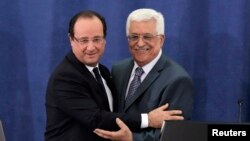French President Francois Hollande is urging Israel and the Palestinians to finally make peace, saying Jerusalem must be the capital of both Israel and a Palestinian state.
Hollande made the comments while addressing Israel's parliament, the Knesset late Monday, urging both sides to make gestures that could further advance the peace process.
He also sought to reassure Israel about negotiations between world powers and Iran, telling Israeli lawmakers France would never allow Iran to arm itself with nuclear weapons.
Prior to the French president's speech, Israeli Prime Minister Benjamin Netanyahu called on Palestinian President Mahmoud Abbas to recognize Israel's right to exist as the Jewish state. Netanyahu also offered to go to Ramallah to speak to the Palestinian people.
Earlier Monday, Hollande called on Israel to stop building settlements in occupied territory, saying the construction complicates ongoing negotiations with the Palestinians.
"France opposes settlements, and we call for the halting of settlements because they complicate negotiations and make the two-state solution difficult," said President Hollande.
Hollande spoke Monday at a joint news conference with Palestinian President Mahmoud Abbas in Ramallah.
Israeli and Palestinian negotiators began a fresh round of peace talks in July, committing to carry out the talks for nine months. The negotiations are taking place in private, but both sides have signaled that little progress has been made.
Abbas expressed frustration Monday with the slow pace and with the way Israel has engaged in the process, despite releasing some Palestinian prisoners.
"There is a misunderstanding amongst the Israelis that they are releasing prisoners in exchange for settlement activities, and this is not true. This led the Palestinian negotiating team to submitting their resignation. We have not yet looked into this resignation, and we have not said if we will agree on it or not. We have been continuing the negotiations for nine months," said President Abbas.
More than one-half million Israeli settlers now live in the West Bank and East Jerusalem, territories captured by Israel in the 1967 war that Palestinians envision as part of a future independent state. The international community rejects those settlements as illegal.
Meanwhile, a series of U.N.-backed building projects in the Gaza Strip have come to a halt.
UNRWA media advisor Adnan Abu Hasna told Reuters Television that workers at most have sites have simply run out of material.
"Israel bans construction material for the private sector and the international organizations. Due to this we halted work on 20 building projects. The costs of these projects are $75 million. These projects include building schools, housing units, clinics and infrastructure inside refugee camps," said Abu Hasna.
Israel imposed a ban on building materials after it discovered a Hamas-built tunnel last month. Israel alleged militants planned to use the tunnel for attacks inside its territory.
Neighboring Egypt has also closed smuggling tunnels used to take goods between Israel and Gaza. The United Nations says that move has caused the economic situation in the Gaza Strip, where unemployment is at 30 percent, to worsen.
Hollande made the comments while addressing Israel's parliament, the Knesset late Monday, urging both sides to make gestures that could further advance the peace process.
He also sought to reassure Israel about negotiations between world powers and Iran, telling Israeli lawmakers France would never allow Iran to arm itself with nuclear weapons.
Prior to the French president's speech, Israeli Prime Minister Benjamin Netanyahu called on Palestinian President Mahmoud Abbas to recognize Israel's right to exist as the Jewish state. Netanyahu also offered to go to Ramallah to speak to the Palestinian people.
Earlier Monday, Hollande called on Israel to stop building settlements in occupied territory, saying the construction complicates ongoing negotiations with the Palestinians.
"France opposes settlements, and we call for the halting of settlements because they complicate negotiations and make the two-state solution difficult," said President Hollande.
Hollande spoke Monday at a joint news conference with Palestinian President Mahmoud Abbas in Ramallah.
Israeli and Palestinian negotiators began a fresh round of peace talks in July, committing to carry out the talks for nine months. The negotiations are taking place in private, but both sides have signaled that little progress has been made.
Abbas expressed frustration Monday with the slow pace and with the way Israel has engaged in the process, despite releasing some Palestinian prisoners.
"There is a misunderstanding amongst the Israelis that they are releasing prisoners in exchange for settlement activities, and this is not true. This led the Palestinian negotiating team to submitting their resignation. We have not yet looked into this resignation, and we have not said if we will agree on it or not. We have been continuing the negotiations for nine months," said President Abbas.
More than one-half million Israeli settlers now live in the West Bank and East Jerusalem, territories captured by Israel in the 1967 war that Palestinians envision as part of a future independent state. The international community rejects those settlements as illegal.
Meanwhile, a series of U.N.-backed building projects in the Gaza Strip have come to a halt.
UNRWA media advisor Adnan Abu Hasna told Reuters Television that workers at most have sites have simply run out of material.
"Israel bans construction material for the private sector and the international organizations. Due to this we halted work on 20 building projects. The costs of these projects are $75 million. These projects include building schools, housing units, clinics and infrastructure inside refugee camps," said Abu Hasna.
Israel imposed a ban on building materials after it discovered a Hamas-built tunnel last month. Israel alleged militants planned to use the tunnel for attacks inside its territory.
Neighboring Egypt has also closed smuggling tunnels used to take goods between Israel and Gaza. The United Nations says that move has caused the economic situation in the Gaza Strip, where unemployment is at 30 percent, to worsen.





